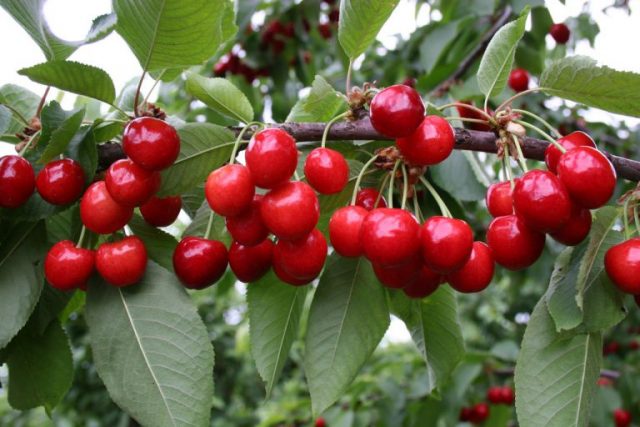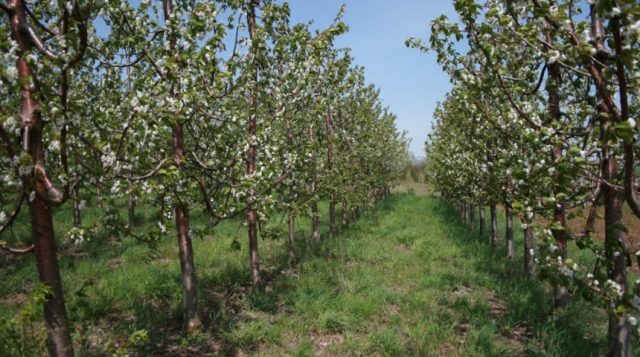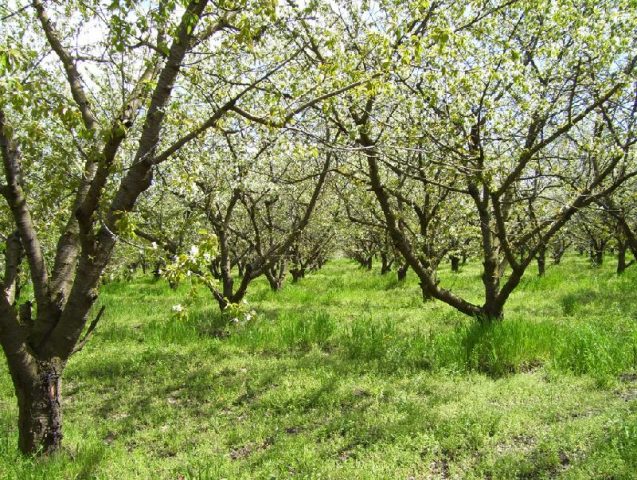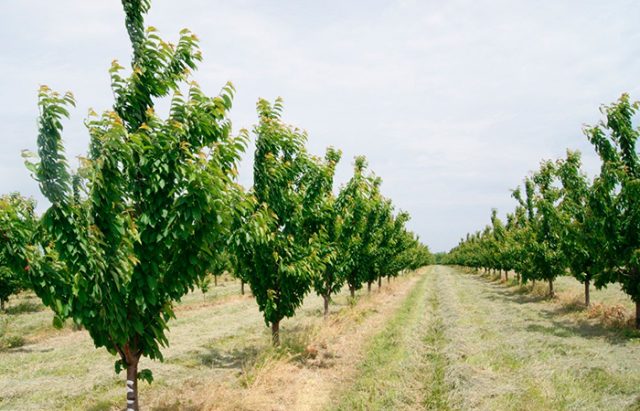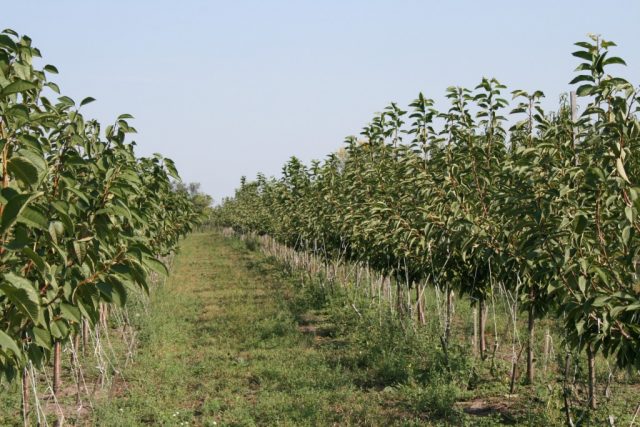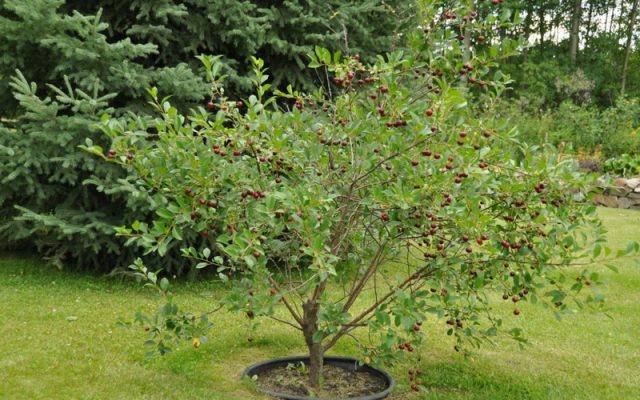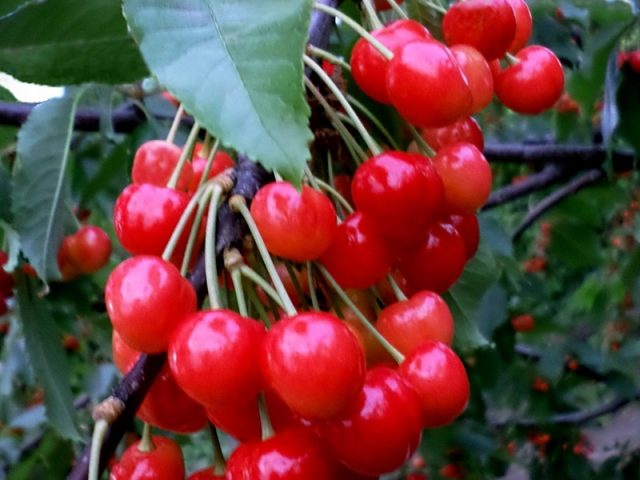Content
The selection of fruit trees does not stand still - new varieties appear regularly. Cherry Gift to the Eagle is one of the newest varieties bred in recent years.
Breeding history of the variety
Sweet cherry, belonging to the category of trees with early ripening, was bred in 2010. So far, the variety is under state variety testing. The originators of cherries are A.F. Kolesnikov and M.A. Makarkin, as well as E.N. Dzhigadlo and A.A. Gulyaeva. The seedlings freely pollinated with Bigarro cherries served as the source for the selection.
Description of cherry variety Gift to the Eagle
Sweet cherry of this variety is a tree of medium height - usually no more than 3.2 m. The bark on the main trunk and skeletal branches is smooth, gray in color, and the shoots of the sweet cherry are straight, covered with brownish-brown bark. The crown of this fruit tree variety is sparse and slightly spreading, raised, pyramidal in shape, with large green leaves common for cherries, pointed at the edges.
In May, the Gift to the Eagle releases its first flowers - the variety belongs to the early blooming category. In mid-June, the sweet cherry bears fruit - heart-shaped, rounded red berries, covered with a thin smooth skin. The average weight of the cherry of this variety is small - about 4 - 4.5 g. The taste of the berries is sour-sweet, with pulp that easily separates from the stone. The tasting score of this variety is 4.6 points out of a possible 5.
It is recommended to grow sweet cherries in the Central region and southern regions of the country.
Characteristics
Since the Oryol cherry variety remains fairly new, not much information is known about it. But the basic information is available - and before purchasing a seedling for your garden, it will be useful to familiarize yourself with it.
Drought resistance, frost resistance
Drought tolerance in the Gift to the Eagle is quite high - like in many varieties of sweet cherries recommended for cultivation in the middle lane. During spring, summer and autumn, the fruit plant requires almost no watering, especially in the presence of natural precipitation. In the absence of severe drought, abundant additional watering is required for the tree only three times a year - during the growing season, just before fruiting, and shortly before the onset of winter.
In the summer heat, in the absence of rain, you can water the cherry in the amount of 2 - 4 buckets under the trunk once a month, during fruiting - once every 7 - 10 days.
The frost resistance of the variety is considered average. During the observation period, it was found that sweet cherries are capable of tolerating negative temperatures up to -36 degrees, the degree of freezing in this case is only 2 points.
Pollination, pollinating varieties, flowering and ripening periods
Eagle's gift is a self-fertile cherry variety. In other words, for the appearance of fruits on the branches, planting in the immediate vicinity of pollinating varieties is necessary.
Since cherry blossoms in early May, and bears fruit in mid-June, only varieties with similar characteristics - early flowering and fruiting are suitable for pollination. Among these cherries are:
- Bigarro - the cherry variety used for breeding is also suitable for pollination purposes. Bigarro blooms in early May, it can bear fruit around June 15th.
- Valery Chkalov Is another variety that blooms at the very beginning of May and bears fruit in the first decade of June.
- Iput - this variety also produces flowers in early May and produces its first berries in mid to late June.
In addition to those listed, other varieties can be used to pollinate the Gift to the Eagle. The main condition is to select trees with the same flowering and fruiting times.
Productivity and fruiting
The average yield for the Gift to the Eagle is about 72 centners of fruits per hectare, or several tens of kilograms of berries from one tree.
For the first time, cherries begin to bear fruit at 3 years after the rooting of the seedling - provided that an annual tree was used. The variety bears fruit annually. With proper pollination and care, you can pick berries from the Gift to the Eagle from June 15 until the end of the month.
Scope of berries
The fruits of the Gift to the Eagle are not stored for very long - about 5 - 7 days. Accordingly, cherries are best suited for fresh consumption. You can also cook jam from berries, make a tasty and healthy compote, squeeze juice.
Disease and pest resistance
A gift to the Eagle is considered a variety with a fairly high resistance to common fungal diseases - moniliosis and coccomycosis. At the same time, the plant can suffer from the most dangerous insect pests for fruit trees - aphids, cherry flies and weevils.
Advantages and disadvantages of the variety
Summarizing the information, the following advantages of the variety can be noted:
- high resistance to low temperatures;
- good drought tolerance;
- resistance to diseases of fungal origin;
- early ripening of tasty fruits.
But the variety also has disadvantages. Among them are the small size and weight of the fruits, their short shelf life, and self-infertility.
Landing features
Planting rules for cherries The Gift to the Eagle is quite standard, without unique features. However, it is worth recalling the main points.
Recommended timing
Although it is permissible to plant cherries in spring and autumn, in the middle lane, gardeners prefer to root seedlings in the spring, shortly before the growing season. The fact is that young seedlings are highly sensitive to frost, and an autumn planting can negatively affect their health.
Choosing the right place
The main requirement for the landing site is good illumination. The fruit plant prefers loamy or sandy loam varieties of soil, does not like excessive moisture.
What crops can and cannot be planted nearby
The Gift to the Eagle variety gets along extremely badly with apple trees and pears. The best neighbors for the plant will be cherries or other cherries suitable for pollination.
Selection and preparation of planting material
The requirements for the seedlings of the variety are simple. It is only important to control that the young plant has a dense and branched root system without damage.
Landing algorithm
In order for the seedling to take root well in the ground, it is necessary to dig a shallow hole - about 2 times larger in size than the volume of the root system. The bottom of the pit is filled with soil mixed with organic fertilizers. After that, the seedling is carefully lowered into the hole and sprinkled with earth.
Immediately after planting, the cherries must be watered well, and then the soil around the trunk must be mulched. For even growth, the seedling can be tied to a support.
Follow-up care of the culture
The rules for caring for the variety are standard. For the healthy development of cherries, the following measures must be taken.
- Pruning of branches is carried out for sanitary purposes - to remove dry and weakened shoots.
- Watering cherries is carried out as needed. In the presence of rains, the Gift to the Eagle is watered in volumes of 2 - 4 buckets before flowering, before fruiting and in mid-autumn. In summer drought conditions, it is recommended to supply cherries with water every 10 days.
- In the first three years of growth, a young tree does not require fertilizers, except for those that were applied initially. Subsequently, it is recommended to feed the Gift to the Eagle with nitrogenous fertilizers in the spring, substances containing potassium in the summer, and fluorine-containing mixtures - before the onset of winter.
- In order for the plant not to be damaged by rodents, it is recommended to wrap the trunk with a dense material - for example, roofing material. Whitewashing of cherries with lime will also serve as a protective measure.
Preparing the tree for winter includes abundant watering at the end of September and feeding the cherries with organic fertilizer. In winter, a dense snowdrift is formed around the trunk, and the snow around the tree is trampled down - this will protect the cherries from rodents and from freezing.
Diseases and pests, control and prevention measures
The gift to the Eagle is quite resistant to fruit rot and coccomycosis - you can protect the tree from fungal infections with timely sanitization.
Garden pests are more dangerous for the variety - cherry fly, weevil, aphid. Gardeners are advised to regularly inspect cherries for harmful insects - and when they appear, spray the tree with insecticidal agents.
Conclusion
Sweet cherry Podarok Orel is a young but very promising sweet cherry variety for central Russia. With basic care, the tree will produce consistently high yields.
Testimonials

